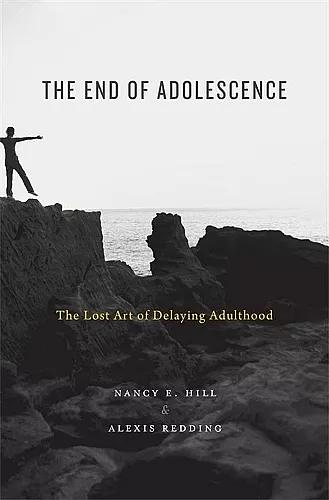The End of Adolescence
The Lost Art of Delaying Adulthood
Nancy E Hill author Alexis Redding author
Format:Hardback
Publisher:Harvard University Press
Published:30th Apr '21
Should be back in stock very soon

Is Gen Z resistant to growing up? A leading developmental psychologist and an expert in the college student experience debunk this stereotype and explain how we can better support young adults as they make the transition from adolescence to the rest of their lives.
Experts and the general public are convinced that young people today are trapped in an extended adolescence—coddled, unaccountable, and more reluctant to take on adult responsibilities than previous generations. Nancy Hill and Alexis Redding argue that what is perceived as stalled development is in fact typical. Those reprimanding today’s youth have forgotten that they once balked at the transition to adulthood themselves.
From an abandoned archive of recordings of college students from half a century ago, Hill and Redding discovered that there is nothing new about feeling insecure, questioning identities, and struggling to find purpose. Like many of today’s young adults, those of two generations ago also felt isolated and anxious that the path to success felt fearfully narrow. This earlier cohort, too, worried about whether they could make it on their own.
Yet, among today’s young adults, these developmentally appropriate struggles are seen as evidence of immaturity. If society adopts this jaundiced perspective, it will fail in its mission to prepare young adults for citizenship, family life, and work. Instead, Hill and Redding offer an alternative view of delaying adulthood and identify the benefits of taking additional time to construct a meaningful future. When adults set aside judgment, there is a lot they can do to ensure that young adults get the same developmental chances they had.
Professors Hill and Redding convincingly dismiss the widely held view that contemporary young people are fundamentally different from their counterparts who came of age a half-century ago. The End of Adolescence reminds us that the essential psychological challenges inherent in becoming an adult in today’s society—and the supports that adolescents need to make this transition successfully—are not all that dissimilar from what they were in past generations. Scholars and students of adolescence should read this thoughtful book. -- Laurence Steinberg, author of Age of Opportunity: Lessons from the New Science of Adolescence
This book is a must-read for anyone who cares deeply about one of the most misunderstood populations in our society—emerging adults. The process adolescents used for self-discovery and preparing for the world of work has changed dramatically. Yet as the book reminds us, it’s not young people who have changed over time, it’s their contexts and opportunities. -- Angel B. Pérez, Ph.D., CEO, National Association for College Admission Counseling
This engaging book uses an untapped treasure trove of interviews from college students in the 1970s to draw insights for today. Young adults thrive when we give them the space to develop, when they can find community while staying connected to home, and when they have time to pursue career interests. Delaying adulthood is not new and it is not harmful—if used safely and well. -- Adam Gamoran, Ph.D., President, William T. Grant Foundation
The End of Adolescence fills a void in research on adolescence and young adulthood development, as Hill and Redding address an age-old question: ‘Are kids these days different than those in the past?’ Hill and Redding’s innovative research reveals that what has changed is not today’s youth, but rather the historical context in which they have developed. This timely book should be required reading for anyone interested in a deeper understanding of adolescence and young adult development. -- Velma McBride Murry, Vanderbilt University and President, Society for Research on Adolescence
ISBN: 9780674916500
Dimensions: unknown
Weight: unknown
232 pages